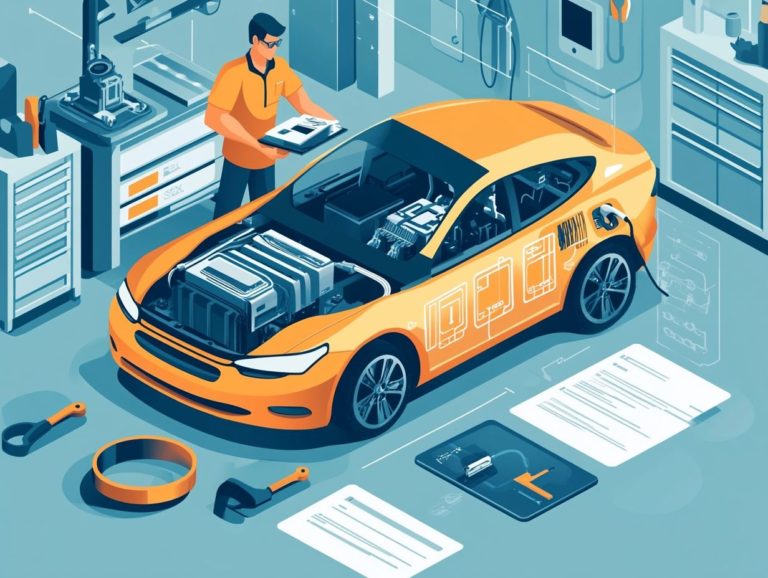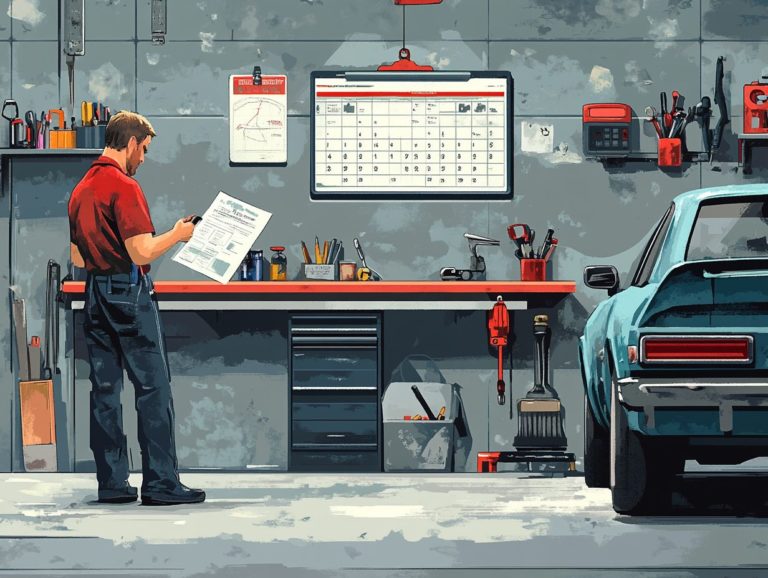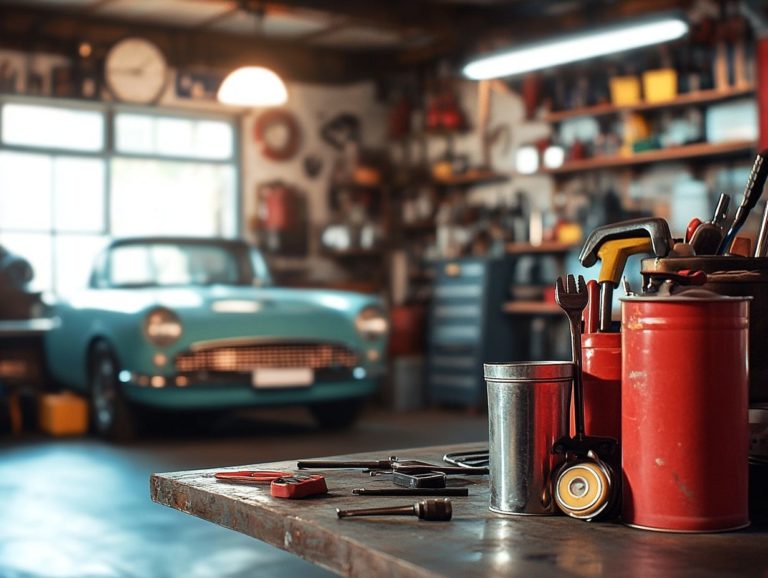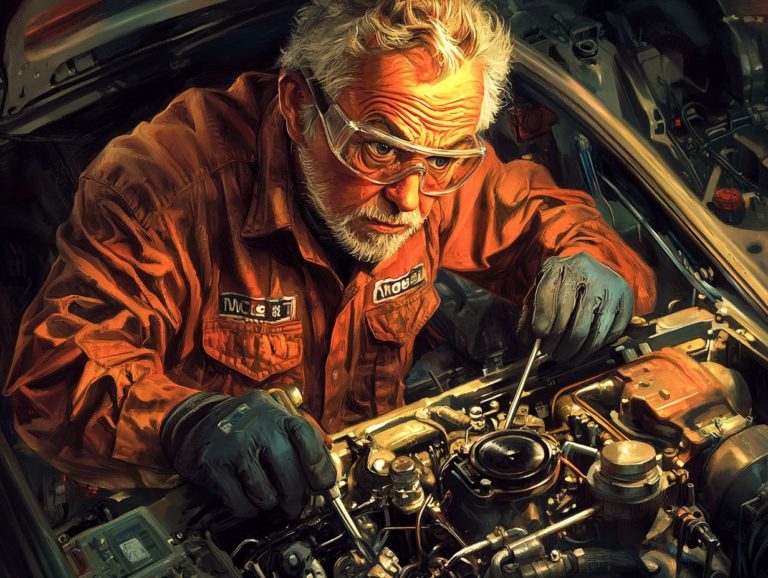How to Maintain Your Car’s Cooling System
Want to keep your car running like new? Your cooling system is the heart of your engine! It’s vital for maintaining the engine’s temperature and ensuring optimal performance.
Like any mechanical system, it can face challenges that may lead to breakdowns and expensive repairs. This article delves into the signs of a faulty cooling system, offers essential maintenance tips to keep it running smoothly, and provides guidance on when to seek professional assistance.
You ll also uncover strategies to prevent issues and identify when it’s time to replace components. Discover how to keep your vehicle cool and efficient on the road!
Contents
- Key Takeaways:
- Signs of a Faulty Cooling System
- Maintaining Your Car’s Cooling System
- Preventing Cooling System Issues
- Replacing Cooling System Components
- Frequently Asked Questions
- What is a car s cooling system?
- How often should I check and maintain my car s cooling system?
- What are some signs that my car s cooling system needs maintenance?
- What are some maintenance tasks I can do to keep my car s cooling system in good condition?
- Can I do the maintenance for my car s cooling system myself?
- What happens if I neglect maintenance for my car s cooling system?
Key Takeaways:
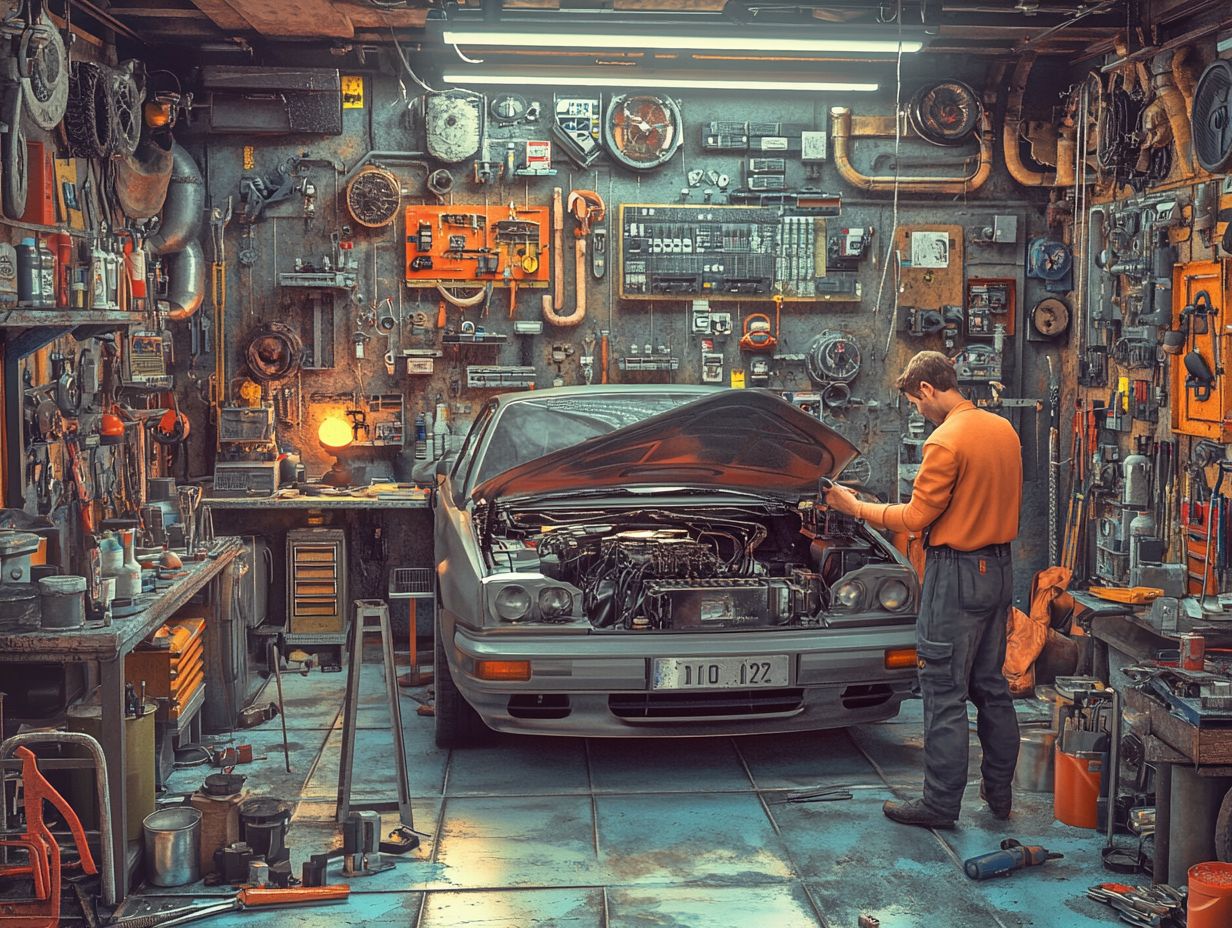
- Regular maintenance is crucial for keeping your car’s cooling system in good condition and preventing costly issues down the road.
- Look out for warning signs of a faulty cooling system, such as overheating or leaking fluids. Seek professional help if needed to avoid further damage.
- Replacing components of your cooling system when necessary is important for maintaining its effectiveness. Remember to follow manufacturer recommendations for replacement intervals.
What is a Cooling System?
The cooling system in your vehicle is a vital component engineered to regulate engine temperature and prevent overheating. This ensures your engine operates at peak efficiency.
This intricate system consists of several key parts, including the radiator, coolant reservoir, water pump, and hoses, all working in harmony to maintain optimal performance.
The radiator dissipates heat from the liquid that keeps your engine cool, allowing it to be recirculated at a cooler temperature. The coolant reservoir stores excess fluid, guaranteeing a steady supply for the entire system.
The thermostat is a device that controls engine temperature by monitoring it and regulating coolant flow to ward off overheating.
Regular inspections of each of these components are essential to spot leaks, clogs, or any wear and tear. By prioritizing maintenance, you can significantly boost the efficiency of your cooling system, ultimately extending your engine’s life and sparing yourself from costly repairs due to overheating incidents.
Signs of a Faulty Cooling System
Recognizing the signs of a faulty cooling system is vital for you as a vehicle owner. Ignoring these symptoms could result in severe engine damage and expensive repairs.
Common indicators of cooling system issues include overheating, coolant leaks, and unusual engine noises. By diligently monitoring the temperature gauge and regularly checking coolant levels, you can ensure your engine operates at an optimal temperature.
This ultimately extends your vehicle’s lifespan.
Common Symptoms and Warning Signs
Identifying common symptoms of cooling system failure is essential for maintaining your vehicle’s performance. Symptoms like engine overheating, coolant leaks, or a malfunctioning radiator are red flags that demand your immediate attention.
You might notice unusual sounds, such as hissing or gurgling, which can indicate trapped air or a failing water pump. A sudden drop in coolant levels or puddles forming beneath your vehicle could suggest coolant leaks that threaten to undermine the system s efficiency.
Neglecting these signs can seriously jeopardize your engine’s overall health. This underscores the necessity of routine checks and timely repairs. Regularly monitoring your cooling system extends your vehicle’s lifespan and boosts its reliability on the road.
Maintaining Your Car’s Cooling System
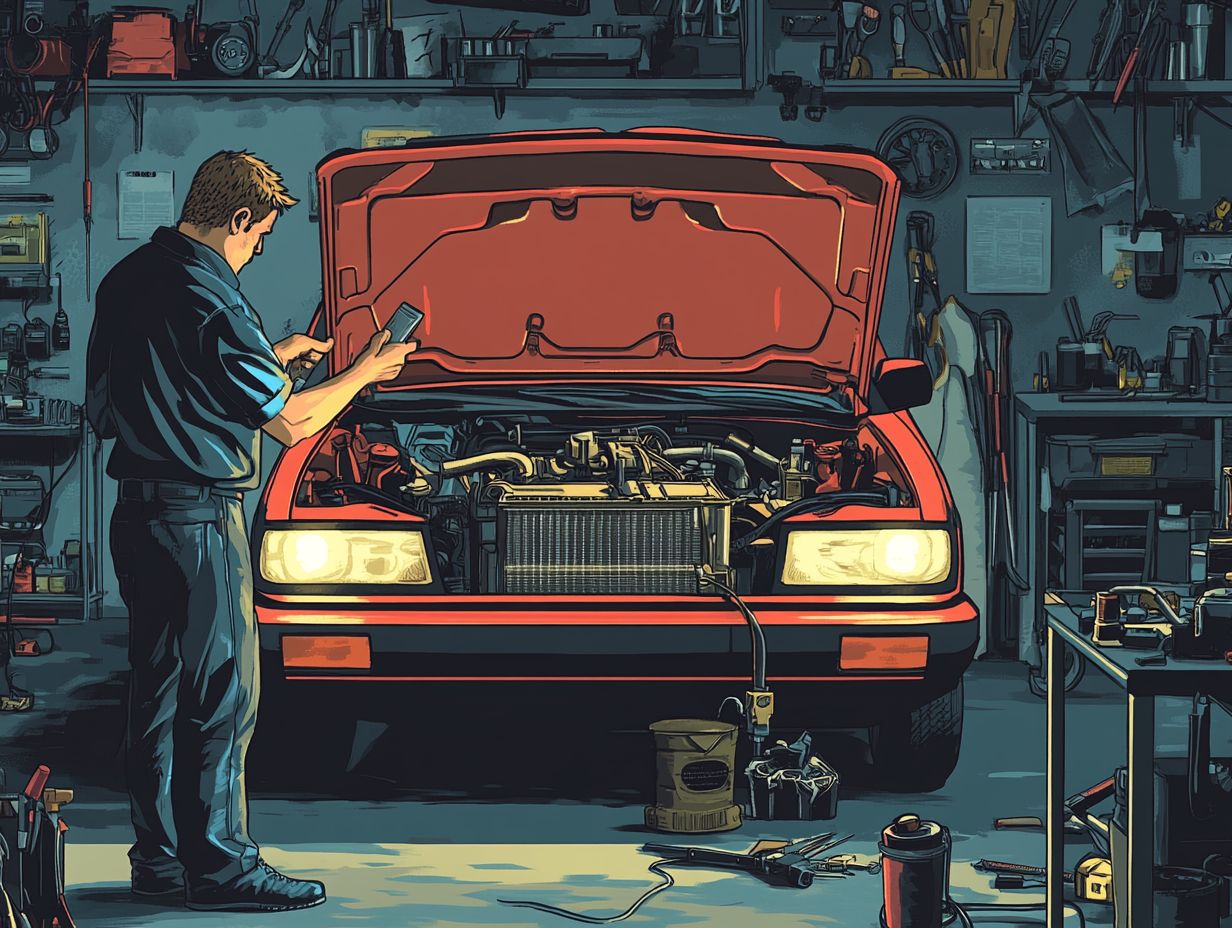
Maintaining your car’s cooling system is crucial for ensuring optimal engine performance and longevity. In addition to this, knowing how to maintain your car’s fuel system plays a vital role in regulating engine temperature and preventing overheating.
By regularly checking coolant levels and flushing the system, you can significantly enhance the efficiency of your cooling system. Inspecting hoses and components is also essential.
Investing in professional inspections can help identify potential issues before they escalate into costly repairs. This ensures your system operates seamlessly.
Check your cooling system today your engine will thank you later!
Regular Maintenance Tasks
Regular maintenance tasks are essential for your vehicle’s cooling system. They help it run efficiently and avoid costly repairs.
Keeping the engine cool is vital for performance. Neglecting this system can lead to overheating and engine damage.
Check your coolant levels regularly to prevent leaks. Flushing the system helps clear out built-up rust and debris.
Inspect critical components like hoses for cracks. Also, ensure the radiator is clean and unobstructed.
These steps can extend your cooling system’s life. By addressing these tasks, you can promote efficient operation and avoid expensive repairs.
When to Seek Professional Help
Knowing when to get professional help for your cooling system can save you money. If you notice persistent overheating, coolant leaks, or a dip in engine performance, consult a professional.
Ignoring these signs can lead to serious issues like engine damage. A qualified technician can evaluate parts such as the radiator and water pump.
Regular checks boost your vehicle’s performance. Catch minor issues early to prevent costly repairs.
If your cooling system isn t performing well, seek expert guidance. This protects your vehicle’s longevity and ensures a reliable ride for years.
Preventing Cooling System Issues
Preventing cooling system issues is crucial for every vehicle owner. Additionally, understanding how to maintain your car’s suspension system can contribute to overall vehicle efficiency, ensuring an active maintenance routine.
Regularly check coolant levels and flush the system. Inspect hoses and the radiator to ensure a durable and dependable cooling system.
Tips for Keeping Your Cooling System in Good Condition
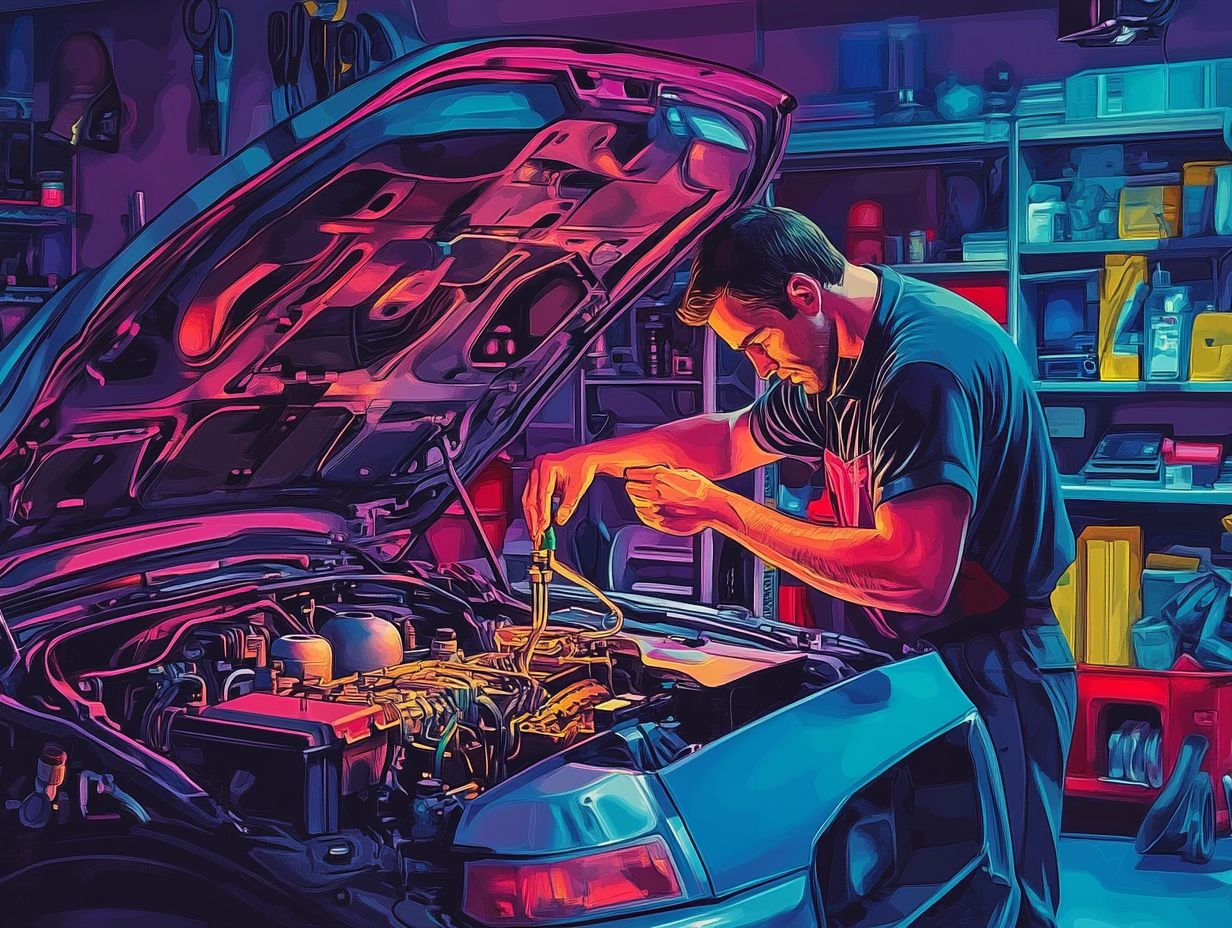
Keeping your cooling system in top shape prevents overheating and ensures smooth engine operation. Regularly check the coolant levels and inspect for wear.
Monitor the coolant s condition for any discoloration or sediment. Promptly replace any worn or cracked hoses to avoid costly leaks.
Check the thermostat and ensure the water pump works well. Schedule professional inspections for valuable insights into potential issues.
Replacing Cooling System Components
Replacing cooling system components is crucial for efficient engine operation. It also protects against overheating.
Components like the radiator and water pump may wear out over time. Timely replacements are essential for optimal performance.
When and How to Replace Parts
Understanding when and how to replace parts in your cooling system can greatly enhance your vehicle’s performance and lifespan. Components like the radiator and water pump should be replaced at the first signs of wear, such as leaks or overheating. Adhering to manufacturer recommendations for the replacement process is essential.
In addition to the radiator and water pump, check hoses and the thermostat, as these critical components may also need attention over time. Regularly inspecting hoses for cracks, bulges, or soft spots can save you from major failures down the road.
Don’t forget to replace the coolant regularly to keep your engine happy! When it s time for a replacement, start by gathering the necessary tools and replacement parts. Consult your vehicle manual for specific instructions, and always prioritize safety by allowing the engine to cool down before getting started.
Lastly, remember that proper disposal of old parts and fluids is not just good practice; it s vital for protecting the environment.
Importance of Regular Maintenance for Your Car’s Cooling System
The importance of regular maintenance for your car’s cooling system cannot be overstated; it’s essential for preventing overheating and avoiding costly repairs. By sticking to a consistent maintenance schedule and checking coolant levels, what to know about engine coolant maintenance, and inspecting components, you can significantly enhance the efficiency and longevity of your vehicle’s cooling system.
Regular maintenance not only protects you from unexpected breakdowns but also ensures that every part is functioning at its best. Neglecting straightforward tasks like changing the coolant or checking for leaks can lead to bigger issues, heightening the risk of engine damage. This proactive approach keeps your engine running smoothly and improves fuel efficiency, ultimately saving you money in the long run.
By investing just a little time and effort into maintaining the cooling system, you’re safeguarding your vehicle against severe problems that can lead to expensive repairs and unwanted downtime.
Frequently Asked Questions
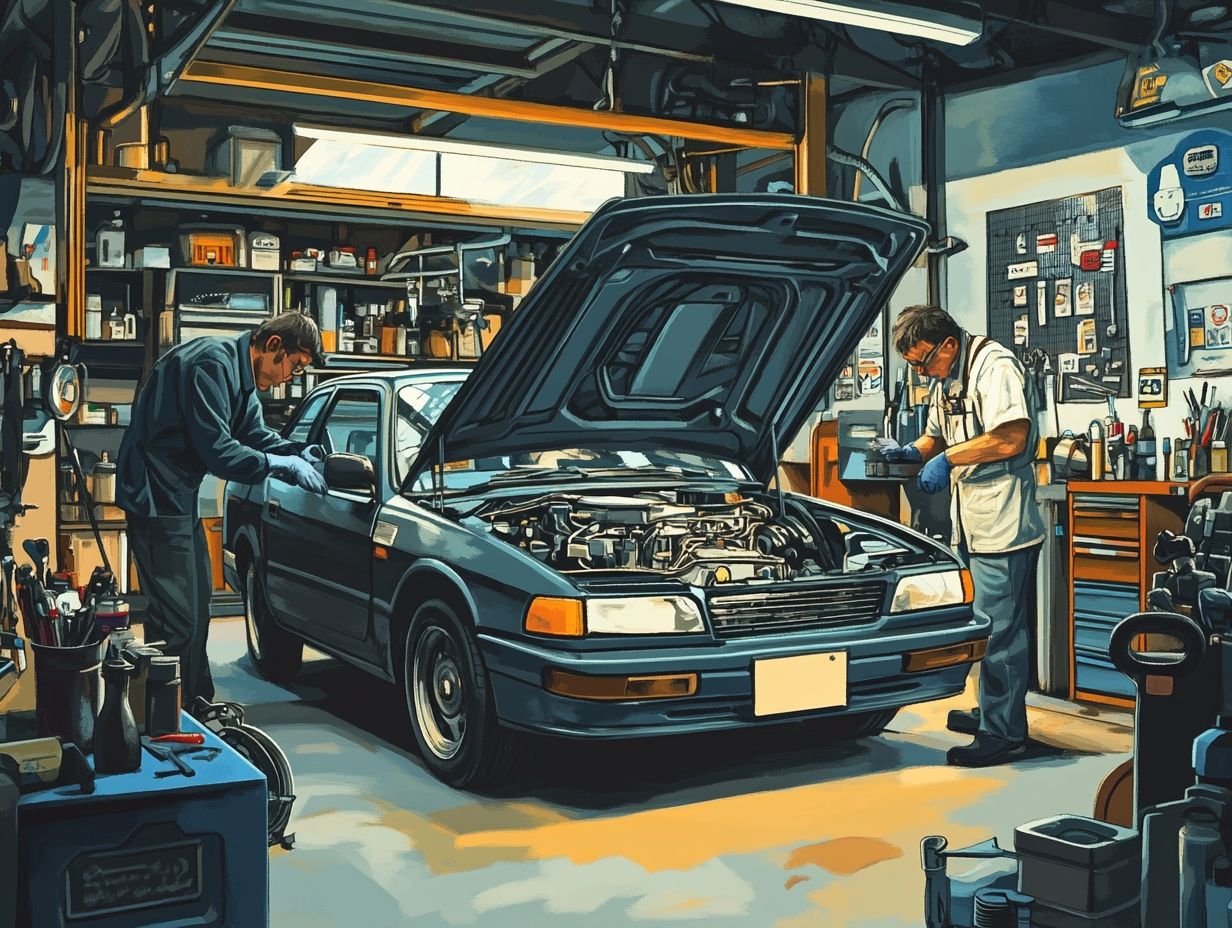
What is a car s cooling system?
A car s cooling system is responsible for regulating the temperature of the engine by circulating coolant through the engine and radiator, preventing it from overheating.
How often should I check and maintain my car s cooling system?
Be sure to check your car s cooling system at least once a year or every 12,000 miles, whichever comes first.
What are some signs that my car s cooling system needs maintenance?
Signs that your car s cooling system needs maintenance include overheating, low coolant levels, strange smells or noises, and leaks under the car.
What are some maintenance tasks I can do to keep my car s cooling system in good condition?
Some maintenance tasks you can do to keep your car’s cooling system in good condition include regularly checking and replacing coolant levels, flushing the system every 2-3 years, and inspecting and replacing any worn or damaged parts.
Can I do the maintenance for my car s cooling system myself?
While some maintenance tasks can be done by yourself, it is recommended to have a professional mechanic inspect and maintain your car s cooling system to ensure it is done properly and to prevent any potential damage to your car.
What happens if I neglect maintenance for my car s cooling system?
Neglecting maintenance for your car s cooling system can lead to serious and costly damage to your engine, as well as potential breakdowns and safety hazards while driving.


